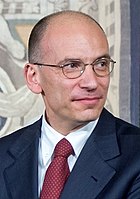Letta Cabinet
| Letta cabinet | |
|---|---|
|
62nd cabinet of Italy |
|
 |
|
| Date formed | 28 April 2013 |
| Date dissolved | 22 February 2014 (300 days) |
| People and organisations | |
| Head of government | Enrico Letta |
| Head of state | Giorgio Napolitano |
| Total no. of ministers | 22 |
| Member party |
Democratic Party (10) New Centre-Right (5) Civic Choice (1) Union of the Centre (1) Italian Radicals (1) Populars for Italy (1) Independents (3) |
| History | |
| Election(s) | 2013 |
| Predecessor | Monti Cabinet |
| Successor | Renzi Cabinet |
The Letta cabinet was the sixty-second cabinet of the government of Italy announced on 27 April 2013. The cabinet was composed of members of the Democratic Party (PD), The People of Freedom (PdL), Civic Choice (SC), the Union of the Centre (UdC), one member of the Italian Radicals (Rad) and three non-party Independents. The cabinet was the youngest government of Italy until the forming of the Renzi Cabinet, with a median age of 53. The cabinet was sworn in on 28 April and won the confidence vote in both the Chamber of Deputies on 29 April and the Senate on 30 April. On 28 September Silvio Berlusconi announced that he was asking to the PdL's five ministers (Angelino Alfano, Maurizio Lupi, Gaetano Quagliariello, Beatrice Lorenzin and Nunzia De Girolamo) to resign from the government over a tax hike. On 15 November 2013, the PdL split. While Berlusconi re-founded the Forza Italia party, all five PdL ministers, led by Alfano, joined the New Centre-Right party. In the same week, another coalition partner, Civic Choice, suffered a split, with minister of defense Mario Mauro leaving the party and founding the new Populars for Italy. Nevertheless, he kept his ministry.
On 22 April 2013, the President of the Republic, Giorgio Napolitano, after his re-election, immediately started consultations with the chairmen of the Chamber of Deputies, Senate and political forces, after the failure of the previous attempt with Pier Luigi Bersani after the elections, and the establishment of a panel of experts by the President himself (dubbed as wise men by the press), in order to outline priorities and formulate an agenda to deal with the persistent economic hardship and growing unemployment.
...
Wikipedia
